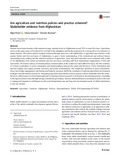| dc.contributor.author | Poole, Nigel | |
| dc.contributor.author | Echavez, Chona | |
| dc.contributor.author | Rowland, Dominic | |
| dc.coverage.spatial | Afghanistan | en |
| dc.date.accessioned | 2018-11-26T15:31:25Z | |
| dc.date.available | 2018-11-26T15:31:25Z | |
| dc.date.issued | 2018-11-14 | |
| dc.identifier.citation | Poole, N.; Echavez, C. and Rowland, D. (2018) Are Agriculture and Nutrition Policies and Practice Coherent? Stakeholder Evidence from Afghanistan, Food Sec. | en |
| dc.identifier.uri | https://opendocs.ids.ac.uk/opendocs/handle/20.500.12413/14146 | |
| dc.description.abstract | Despite recent improvements in the national average, stunting levels in Afghanistan exceed 70% in some Provinces. Agriculture serves as the main source of livelihood for over half of the population and has the potential to be a strong driver of a reduction in under-nutrition. This article reports research conducted through interviews with stakeholders in agriculture and nutrition in the capital, Kabul, and four provinces of Afghanistan, to gain a better understanding of the institutional and political factors surrounding policy making and the nutrition-sensitivity of agriculture. Semi-structured interviews were conducted with a total of 46 stakeholders from central government and four provinces, including staff from international organizations, NGOs and universities. We found evidence of interdisciplinary communication at the central level and within Provinces, but little evidence of vertical coordination in policy formulation and implementation between the centre and Provinces. Policy formulation and decision making were largely sectoral, top-down, and poorly contextualised. The weaknesses identified in policy formulation, focus, knowledge management, and human and financial resources inhibit the orientation of national agricultural development strategies towards nutrition-sensitivity. Integrating agriculture and nutrition policies requires explicit leadership from the centre. However, effectiveness of a food-based approach to reducing nutrition insecurity will depend on decentralising policy ownership to the regions and provinces through stronger subnational governance. Security and humanitarian considerations point to the need to manage and integrate in a deliberate way the acute humanitarian care and long-term development needs, of which malnutrition is just one element. | en |
| dc.language.iso | en | en |
| dc.publisher | Springer Netherlands | en |
| dc.rights.uri | http://creativecommons.org/licenses/by/4.0/ | en |
| dc.subject | Nutrition | en |
| dc.title | Are Agriculture and Nutrition Policies and Practice Coherent? Stakeholder Evidence from Afghanistan | en |
| dc.type | Article | en |
| dc.rights.holder | © The Author(s) 2018 | en |
| dc.identifier.externaluri | https://link.springer.com/article/10.1007%2Fs12571-018-0851-y | en |
| dc.identifier.doi | 10.1007/s12571-018-0851-y | |
| dcterms.dateAccepted | 2017-12-07 | |
| rioxxterms.funder | Default funder | en |
| rioxxterms.identifier.project | Default project | en |
| rioxxterms.version | VoR | en |
| rioxxterms.versionofrecord | https://doi.org/10.1007/s12571-018-0851-y | en |
| rioxxterms.funder.project | 9ce4e4dc-26e9-4d78-96e9-15e4dcac0642 | en |


